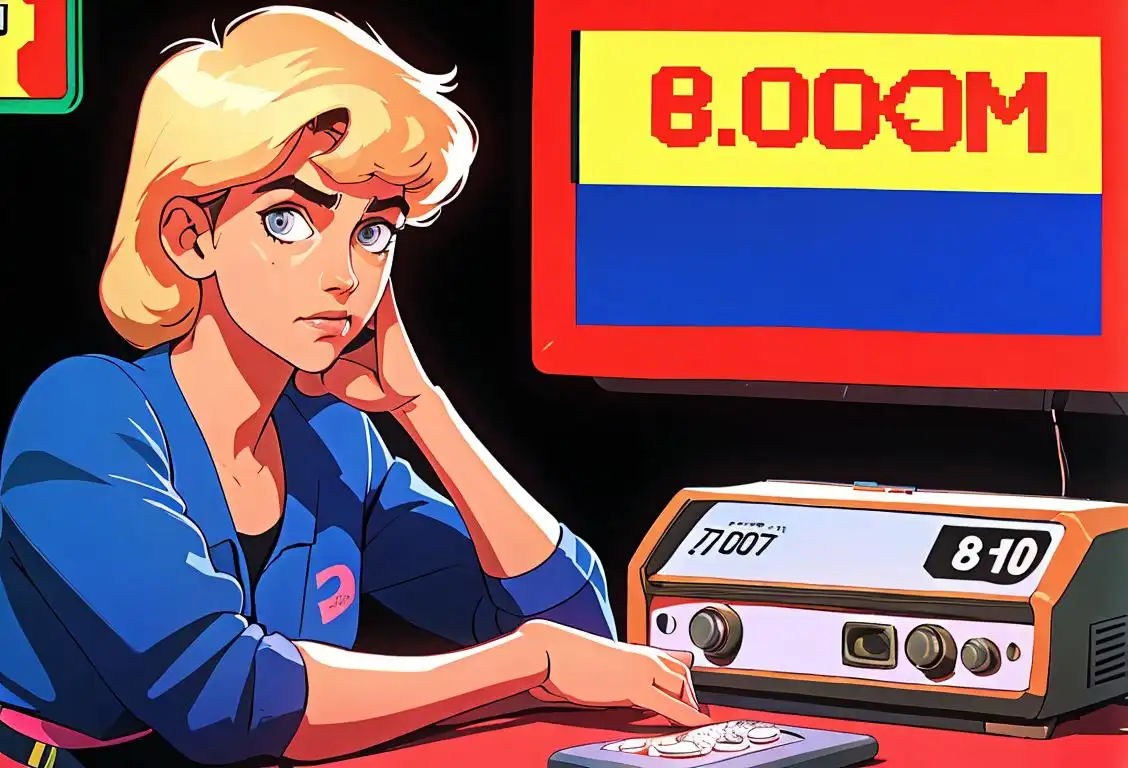National Toss Your Pager In The Trash Day

Hey there! Have you ever used a pager before? You know, those ancient devices that would beep and vibrate to notify you of an incoming message? Well, it turns out there's actually a day dedicated to tossing those relics in the trash. National Toss Your Pager in the Trash Day celebrates the end of an era, when pagers were the epitome of communication technology. So sit back, relax, and let's dive into the fascinating history of this quirky holiday!
When is Toss Your Pager In The Trash Day?
It's national toss your pager in the trash day on the 19th October.
The Rise and Fall of Pagers
Back in the day, before smartphones ruled the world, pagers were all the rage. These tiny devices, also known as beepers, allowed you to receive and send short alphanumeric messages. They were especially popular among doctors, emergency personnel, drug dealers...wait, scratch that last one. Pagers were essential for staying connected in a time when cellphones were a luxury.
But let's face it, pagers had their limitations. You couldn't make calls or surf the internet with these contraptions. All they did was beep, vibrate, and display a phone number. But hey, who needs fancy features when you can discreetly send a message that says '911' instead of actually explaining what the emergency is? That's the kind of efficiency we need in our lives!
The Birth of National Toss Your Pager in the Trash Day
On October 19, 2015, a group of tech-savvy individuals gathered in a park to bid farewell to their pagers. They had finally embraced the era of smartphones and decided it was time to let go of the past, quite literally, by tossing their pagers in the trash. Little did they know that their quirky celebration would spark the birth of a national day!
Since then, National Toss Your Pager in the Trash Day has become an annual event, reminding us of how far we've come in the world of communication technology. Now, instead of beepers, we rely on sleek smartphones that can do almost everything except fold laundry. It's truly a remarkable transformation.
How to Celebrate?
Ready to toss your pager in the trash and join the celebrations? Here are a few suggestions to make the most of this fun-filled day:
- Gather your old pagers: Dig deep into your drawer of forgotten gadgets and unearth those pagers. If you don't have one, don't worry! You can always borrow a pager from a tech museum or ask your cool neighbor who's stuck in the '90s.
- Say goodbye: Take a moment to thank your pager for its dedicated service. Sure, it might have interrupted your romantic dinner plans or startled you in the middle of a nap, but it was always there when you needed it.
- Host a pager burial ceremony: Find a suitable spot in your backyard and hold a solemn ceremony to bid farewell to your pager. You can even say a few kind words or perform a pager-related eulogy.
- Party like it's 1999: Throw a '90s-themed party to celebrate the end of the pager era. Break out your old Walkman, groove to the tunes of Spice Girls, and relive the glory days of dial-up internet.
Did You Know?
Did you know that the first pager was introduced in 1950? It was a clunky device that could only receive messages and required a separate telephone line. Talk about a blast from the past!
History behind the term 'Toss Your Pager In The Trash'
1980s
Page Your Way to Communication
Pagers, also known as beepers, were first introduced in the 1980s as a revolutionary communication device. These small, portable gadgets allowed individuals to send and receive short alphanumeric messages through radio frequency signals. Initially used mainly by doctors and emergency personnel, pagers quickly gained popularity among professionals as a convenient means of communication.
1994
The birth of the pager
In 1994, pagers became extremely popular for their ability to receive and display short text messages, making communication on the go much easier. Pagers were small electronic devices that could receive numeric or alphanumeric messages, and they quickly became a ubiquitous technology for professionals and individuals alike.
1980
The rise of pagers
Pagers became popular in the 1980s as a convenient way to communicate on the go. These small devices used radio signals to receive numeric messages, allowing people to stay connected even when away from their landline phones.
1990
The birth of pagers
In 1990, Motorola introduced the first commercially successful pager, known as the Motorola Advisor. Pagers revolutionized communication by allowing people to receive short text messages or beeps, signaling that they were needed or had a message waiting. These devices quickly gained popularity, especially among professionals who needed to be constantly reachable.
1980
The birth of the pager
Pagers, also known as beepers, emerged in the 1980s as a revolutionary device for communication. These pocket-sized electronic devices allowed individuals to receive numeric messages or phone numbers, thus enabling instant communication without the need for a phone call.
1980
Pager revolutionizes communication
In 1980, pagers became commercially available, revolutionizing communication. Pagers, also known as beepers, were small devices that could receive short alphanumeric messages and display them to the user. They quickly gained popularity as a way to stay connected on the go.
1994
The rise of cell phones
By 1994, mobile phones were becoming more affordable and widespread. Cell phones offered the convenience of two-way communication and the ability to make phone calls from anywhere. As cell phones gained popularity, pagers started to feel outdated and limited in their capabilities.
Late 1990s
Overwhelming usage of pagers
As the use of pagers increased throughout the late 1990s, their constant beeping and buzzing to notify users of incoming messages became a common annoyance. Pagers were often associated with demanding jobs or being constantly available, creating a culture of immediate responsiveness that some people found overwhelming.
1990s
The Rise of Mobile Phones
In the 1990s, mobile phones started to become more accessible and user-friendly, offering the ability to make calls, send text messages, and even access the internet. As mobile phones replaced pagers, the term 'toss your pager in the trash' emerged as a symbolic act of embracing the superior capabilities of mobile communication. This phrase highlights the transition from simple paging devices to feature-rich smartphones.
1990
Pagers as a status symbol
During the 1990s, pagers gained a trendy reputation as a status symbol. Owning a pager became a symbol of being connected and important. It wasn't uncommon to see individuals proudly displaying their pagers as a fashion statement.
1990
Pagers peak in popularity
During the 1990s, pagers reached the peak of their popularity. Everyone from doctors to business professionals to teenagers carried pagers. It became a status symbol and a necessity for those who had important or urgent messages to receive.
1995
The rise of mobile phones
In the mid-1990s, mobile phones became increasingly popular, offering the ability to make and receive calls on the go. With the advent of mobile phones, the need for pagers started to decline as people embraced the convenience of carrying a single device for both voice and text communication.
Early 2000s
Symbol of professional stress
By the early 2000s, pagers had gained a reputation as a symbol of professional stress and a constant connection to work. The dependence on pagers for communication created a culture of constant availability, blurring the lines between personal and professional life. Many people started to view pagers as a source of anxiety and an intrusion on their personal time.
Late 1990s
The decline of pagers
As cell phones became more affordable and feature-rich, pagers started to decline in popularity. The limited functionality of pagers compared to cell phones made them less desirable. People no longer needed to carry both a cell phone and a pager, and as a result, pagers began to lose their place in everyday communication.
2000
The decline of pagers
By the early 2000s, pagers had largely lost their appeal and market share due to the widespread adoption of mobile phones. The decline of pagers was accelerated by the advancements in technology, such as smartphones, which offered a wide range of features beyond simple communication, such as internet access, multimedia capabilities, and more.
2000
Mobile phones replace pagers
By the early 2000s, pagers faced stiff competition from mobile phones. With the advent of cell phones, which had advanced features like text messaging and voice calls, pagers began to lose their appeal. People started to favor mobile phones for their enhanced capabilities and convenience.
Late 1990s
Advancements in mobile phones
As mobile phones became more accessible and affordable in the late 1990s, the popularity of pagers started to decline. Mobile phones offered more functionality, including the ability to make calls and send text messages directly from the device, making pagers less essential.
2000s
Obsolete Technology
By the 2000s, pagers had become outdated and were considered a relic of the past. The advent of widespread cellphone usage led to a decline in pager popularity, as they lacked the versatility and functionality of modern smartphones. The term 'toss your pager in the trash' gained traction as a metaphorical representation of discarding outdated technology and embracing newer, more advanced forms of communication.
2010
Obsolete technology
In the 2010s, the pager had become an obsolete and outdated piece of technology. Mobile phones had evolved into powerful handheld computers capable of handling various tasks, rendering pagers virtually useless. The once popular communication tool fell out of favor, and people started to dispose of their pagers as they transitioned to more advanced devices.
Early 2000s
The end of an era
By the early 2000s, pagers had become largely obsolete. The convenience and versatility offered by cell phones, with their ability to not only make calls but also send text messages and access the internet, rendered pagers unnecessary for most people. As a result, many individuals and organizations began discarding their pagers, symbolizing the end of an era.
Mid-2000s
Decline of pagers
With the advent of smartphones and other mobile communication devices, pagers gradually became obsolete. The advancements in technology, such as the ability to make phone calls, send text messages, and access the internet on a single device, made pagers redundant. The decline of pagers marked a shift in how people communicated and connected with each other.
Present Day
Nostalgic Reference
Today, the phrase 'toss your pager in the trash' is used nostalgically to reminisce about the technological advancements that have occurred over the years. It serves as a reminder of how far communication technology has evolved, with pagers now being a symbol of a bygone era. The term captures the cultural impact of the shift from pagers to smartphones and celebrates the convenience and capabilities of modern-day communication devices.
2010
Decline of pagers
In the 2010s, pagers continued to decline in popularity. The rise of smartphones with internet connectivity and a plethora of communication apps made pagers obsolete for most people. The once ubiquitous device was now mostly associated with specific industries, such as healthcare.
Early 2000s
The demise of pagers
By the early 2000s, pagers were largely replaced by cell phones as the go-to communication device. The declining popularity of pagers led to the discontinuation of pager services in many areas. The phrase 'toss your pager in the trash' became a metaphor for letting go of outdated technology and embracing more advanced means of communication.
Present day
Symbolic gesture to embrace freedom
In modern times, the phrase 'toss your pager in the trash' has emerged as a symbolic gesture to embrace freedom from constant connectivity and stress. It symbolizes a step towards work-life balance and a rejection of the always-on culture. While pagers are no longer in widespread use, the phrase remains a reminder of the impact of technology on our lives and the quest for a healthier relationship with communication.
Present day
Toss your pager in the trash
Today, the phrase 'toss your pager in the trash' is a symbol of moving on from outdated technology. It represents letting go of the past and embracing the advancements of the digital age. Although pagers may still have some niche applications, they have largely been replaced by more sophisticated and versatile communication devices.
Present
Symbol of technological progress
Today, the phrase 'toss your pager in the trash' is used as a metaphor to symbolize discarding outdated technology and embracing progress. It represents leaving behind the relics of the past and embracing the advancements and conveniences of the present. While pagers may hold nostalgic value for some, they serve as a reminder of how swiftly technology evolves and transforms our daily lives.
Did you know?
Did you know that the first pager was introduced in 1950? It was a clunky device that could only receive messages and required a separate telephone line. Talk about a blast from the past!Tagged
fun nostalgia technologyFirst identified
16th October 2015Most mentioned on
19th October 2015Total mentions
13Other days
Griztroncis Day
Tv In The Same Day
Toss Your Pager In The Trash Day
Landline Telephone Day
Teletext Day
Digital Day
Radio Day
Video Games Day
Comic Book Day
Handwriting Day








